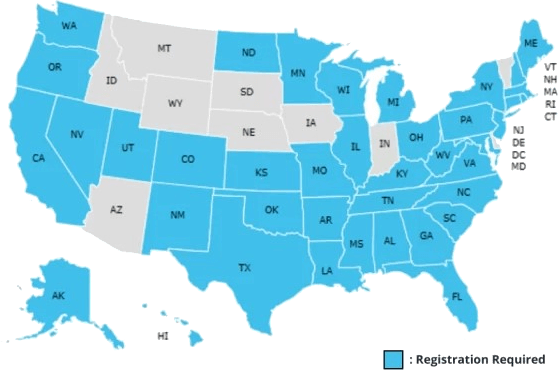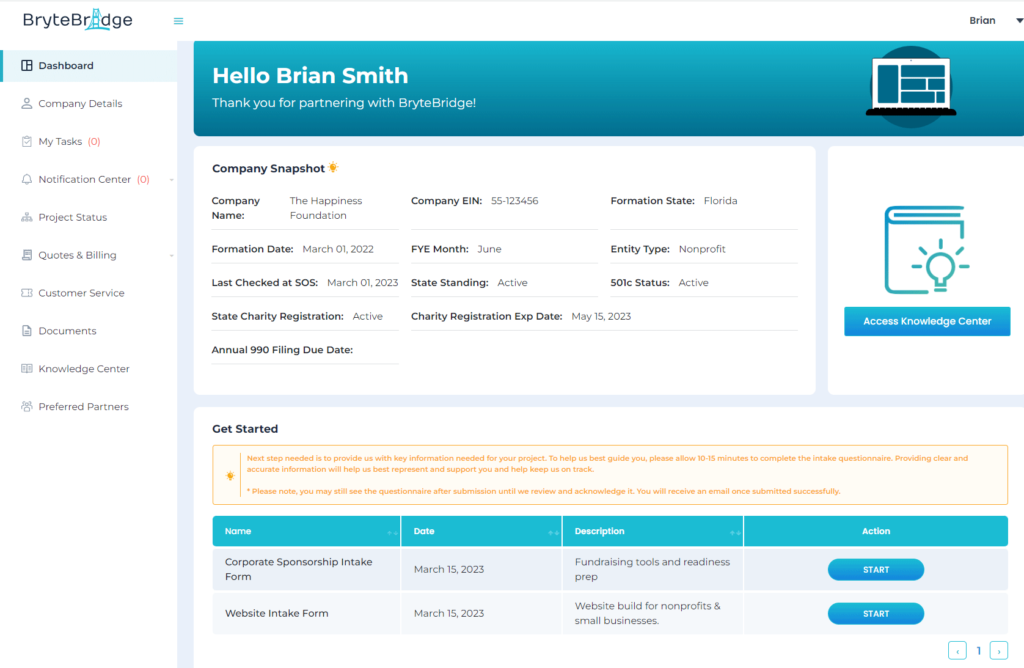Charitable Registration and Solicitation Compliance

It’s not uncommon for 501(c)(3) tax-exempt nonprofit organizations to assume the classification is permission to seek donations. But nonprofit compliance is of the utmost importance for any 501(c)(3) organization.
Unfortunately, 501(c)(3) assigns tax exemptions by the IRS and does not grant explicit permission to raise funds. The IRS doesn’t provide oversight of nonprofit organizations; it only exempts them from federal taxes. Individual states govern nonprofit organizations and their activities. Each state a nonprofit operates or solicits donations likely has unique rules and regulations the organization must adhere to.
Whether a nonprofit was recently formed and is exploring initial fundraising efforts or is well-established and expanding fundraising nationwide, the organization must maintain compliance with each state’s charitable solicitation registration and reporting laws. These laws are designed to earn and retain your community’s and potential donors’ trust. Following the requirements of state laws is a fundamental principle of ethical fundraising.
Fundraising requires proper registration within most states (40) permission. Fundraising without proper permission can result in fines and penalties.
Charity Registrations Follow State Laws
Most states (40) require nonprofit organizations to register before soliciting donations from residents of that state. This restriction applies to soliciting across state lines through the internet, phone, social media, mobile applications, etc. For example, suppose your nonprofit is based in California but solicits donors online in Nevada. In that case, odds are the organization will need to follow both states’ charitable solicitation registration requirements.
“Solicitation” or “soliciting” is generally defined as oral, written, or online requests for contributions or donations. In other words, the organization does not have to be physically located in the state to engage in solicitation activities. An organization’s failure to register in any states it operates or solicits may result in a state investigation, fines, questions from the Internal Revenue Service, and reputational damage from current and potential future donors.

States That Do NOT Require Charitable
Solicitation Registration
- Delaware
- Iowa
- Idaho
- Indiana
- Montana
- Nebraska
- South Dakota
- Vermont
- Wyoming
A few states only require registration if a nonprofit engages in specific activities or uses professional fundraisers. For example, Arizona requires charitable veteran organizations to register if they are soliciting money or other support in the state. Texas has limited registration requirements that only apply to law enforcement, public safety, and veterans organizations. Louisiana only requires registration if a charity engages paid, professional solicitors to fundraise in their state.
Learn more about your State Requirements!
Fundraising Solicitation Can Mean Many Things
Online Fundraising:
Using your website or social media (Twitter, Facebook, GoFundMe, etc.) to solicit donations, such as having a “Donate” button.
Fundraising Events:
Hosting any event (Galas, Run/Walk events, Movie Night, etc.) that asks participants for a donation.
In-Person Asks
Asking for donations directly from the public, friends, family, etc.
Direct Mail
Request donations in a letter or postcard sent through the mail.
Phones Calls or Texting
Reaching out to potential donors via phone or text.
Sending email campaigns asking for donations, whether using an email platform or individually.
Radio, TV, Newspaper, or Magazine Ads
Use ads or print/visual media to promote the organization and ask for donations.
Other standard methods include applying for grants or collecting membership dues.
The Charity Registration Process

To register as a legal charity, your nonprofit must submit a registration or solicitation application, supporting documentation, and often a filing fee to the respective state agency. Most states typically accept online applications, but there are still a few that only operate via mail.
Generally, the registration application requests information about the nonprofit, and requirements vary by state. Here are many of the common requirements:
- IRS Determination Letter confirming 501(c)(3) status
- Articles of Incorporation
- Bylaws
- Board of Directors List
- Officers List
- Professional Fundraisers List
- Registered Agent Information
- Detailed Financial Statements or IRS Form 990
- Governance Documents
Please note that the organization’s registration information will likely be public, just as the IRS makes Form 990 filing public. The nonprofit must provide accurate and detailed info.
Fines and Penalties for Not Registering
Failing to Register or renewing late can result in some unwanted consequences:
- Affect the reputation and trust of current and potential donors and grantmakers.
- Earn fines, late fees, and penalties from the state.
- Bring civil and criminal action against officers and directors.
- Receive tax-exempt status revocation.
- Lose the right to solicit funds in the future.
- Lose existing donations or grants.
While the list of penalties is broad, the best way to avoid repercussions is to stay current with all charitable solicitation registration requirements.


Charitable Registration VS Other Business Registration Requirements
Remember that registering to solicit in a state is not the same as filing for a business license or qualifying to transact business in a state.
You may still need to register or apply for other requirements or opportunities, including:
- Local Business Licenses & Permits
- State Income Tax Exemption
- Annual Report Filings
- State Sales Tax Exemption
- Foreign Registration
Charity Registration and Solicitation Summary
State charitable registration and renewal requirements can be complex, but nonprofit organizations have professional resources available to assist in the process. At BryteBridge, we file thousands of state registrations each year and handle all facets of the registration process. Backed by an easy-to-use website and a team of nonprofit compliance specialists, your nonprofit is in good hands with BryteBridge Nonprofit Solutions managing the charity registration and solicitation process. Just check out our awesome reviews from our many satisfied customers.
Fundraising regulations can differ from state to state; no matter how the nonprofit raises funds, it is “soliciting” the public. Asking for a donation in any way is a regulated activity in most states and will likely require proper registration.
FAQs
A nonprofit must file a charity registration in most states before soliciting donations. Asking for a contribution or selling goods/services that benefit a charitable cause are types of “solicitation” that require a charity registration. An organization does not need to receive a donation to trigger registration requirements in most states.
Approximately 40 states have enacted charitable solicitation statutes. Although specifics vary, the state usually requires organizations to register before soliciting residents for contributions. However, organizations sometimes start to fundraise once they get their 501(C)(3) and must be aware of the state registration requirements. In these cases, the organization should register as soon as it becomes aware of its registration obligations. Often, state agencies will process a “good-faith” late registration without penalty if the organization can provide a justifiable explanation for its lack of earlier registration.
As a leading nonprofit formation and compliance service provider, BryteBridge helps thousands of 501(C)(3) organizations meet initial charitable solicitation registration and renewal requirements each year. We have been supporting nonprofits for nearly twenty years. We have a compliance team of professionals with knowledge and experience to help nonprofits navigate the nuanced rules and regulations of charity registration and other state compliance requirements. You can have confidence in our team to keep your nonprofit in good standing.
Your Pathway to Charity Registration
Do you need help handling the Charity registrations or meeting your state compliance requirements for your Nonprofit? No problem; call the compliance experts at BryteBridge and put our knowledgeable team to work on your side. Schedule an Appointment or call 1-877-857-9002 to get started!
Speak to a Nonprofit Advisor
Please complete the information request and one of our nonprofit advisors will be assigned to work with you.
Please check your email to access their contact information and schedule.
"*" indicates required fields
Nonprofit Compliance Services
In most states, simply applying for federal tax-exempt status and maintaining 990 tax filings is insufficient for meeting state nonprofit compliance requirements. Charitable organizations must meet the specific requirements of the state they are registered in to solicit donations and apply for grant funding. Failure to maintain an organization’s 501c3 compliance may result in penalties and fines, and can hurt your nonprofit’s reputation.
We Help You Through Important Dates for
501(C)(3) Compliance
Running a nonprofit at the start-up stage often means staff members wear “many hats.” With so many different roles and responsibilities, it’s easy to lose track of crucial 501c3 compliance deadlines. Our nonprofit compliance checklist features four critical dates that you can add to your calendar.
- Your organization’s fiscal year-end date. This may be December 31, but it can vary based on your organization.
- Dates for creating your budget and securing board approval. Your operating budget and accounts payable and receivable data will be needed to complete your tax forms. In many organizations, your board will also need to approve them.
- Dates for sending year-end tax receipts. Donation receipts must be sent to donors every January.
- Form 990 and 990-N due dates. Depending on the amount of money your organization earns, you may need to complete Form 990 or Form 990-N.
Get Everything You Need for Nonprofit Compliance in One Place
In addition to following the dates on the nonprofit compliance checklist, BryteBridge can help your organization complete the necessary federal and state tax forms you’ll need to maintain 501c3 compliance. Our primary goal is to make this process as smooth and effortless for you and your organization as possible. We will work with you to ensure you have efficient:
- Nonprofit Compliance Review & Recommendations
- State Charity Registration
- State Income Tax Exemption
- Annual Report
- State Sales Tax Exemption
- Foreign Registration
Important Information
- Please note, some states have more requirements than others.

Let Us Help with Your 501c3 Compliance for Peace of Mind
Working with BryteBridge Nonprofit Solutions on your nonprofit compliance checklist and nonprofit compliance requirements helps you stay focused on what truly matters. We help ensure your nonprofit maintains its positive tax standing. If you need more information or would like to schedule a consultation, contact us to get started today.
State Compliance
$449
Ensures all current required annual state compliance documents are completed to allow you to continue legally soliciting donations in accordance with state & federal guidelines. State and Sales Tax Exemptions are sold separately.
- Online Portal To Monitor Compliance Status
- Annual Report
- Charity Registration (or renewal)
- Up to $100 in state filing Fees. (If applicable)
State Compliance Features
Our state compliance service are designed to ensure your nonprofit is current with annual state requirements, in your home or designated state allowing your organization to legally operate and solicit donations in accordance with state guidelines.
Most states require a charity registration or solicitation to solicit and accept donations. Required to legally ask the public for donations
Online access to monitor compliance status, summarizing our findings, view work that was completed, and see important due dates.
Complete annual reports required by the state to acknowledge nonprofit is active and to alert state of any changes.
Download a Nonprofit Compliance Guide by filling out the form below:
"*" indicates required fields



